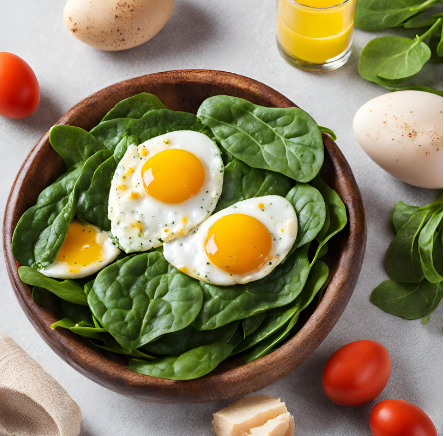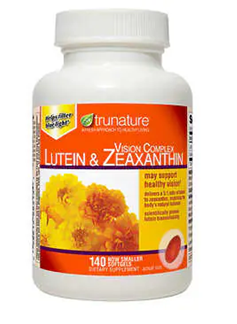

3 Best nutrition tips to protect your eyes
“Is there anything I can eat to protect my eyesight?” Yes! Eat to control diabetes if you have it, eat eye-friendly foods, and take supplements as needed.
Control Diabetes to Protect Your Vision
Uncontrolled blood sugar is the leading cause of blindness in adults. It is vital for people with diabetes get eye exams every single year. This should start right away, when first diagnosed. Problems are easier to fix if caught early.
People with diabetes can also learn ways to control blood sugar by balancing their total carbohydrate intake with activity and medications. Carbs is short for Carbohydrates.
Please remember that carbs are not bad. It is the AMOUNT of carbs that can be bad. You need a “Goldilocks” amount of carb at each meal—not too little and not too much for you to handle.
Too little carb is bad, you can get low blood sugar and can feel angry, anxious, irritable and even faint or dizzy. Carbs are needed for energy in your body and brain.
Too much carb is bad, it can lead to high blood sugars. High blood sugars are bad because that can “sugar frost” proteins all over the body, including the eyes. Sugar frosted proteins don’t work right and cause damage. The scientific term for “sugar frosting” is glycation.
A registered dietitian can help you balance your carb choices and lower your average blood sugar by 30-60 points. This reduces the risk of diabetes eye disease by over 35%. A certified diabetes educator is also a huge help and specializes in other aspects of diabetes care. Ask about diabetes classes at your local hospital or clinic.
Pay attention to the most important measure of blood sugar control, the A1C (“A-one-C”). This lab test is basically acts as a “24/7” internal glucose meter that tells us your average blood sugar the past 2 to 3 months by measuring how sugar-frosted your blood is—an A1C over 9% is high risk, below 8% is better and below 7% is the lowest risk.
Just remember “Lucky number 7” for A1C! Sugar frosting is how high blood sugar damages the body. Keeping it lower keeps you healthier and helps reduce problems in your eyes, kidney, nerves and heart.
Eye friendly foods
Examples of eye-friendly foods includes salmon, sunflower seeds, almonds, pepitas/pumpkin seeds, oranges, berries, kale, spinach, yellow corn, and, most surprisingly, eggs. These foods are good sources of nutrients linked to better eye health such as omega-3 fats, zinc, vitamin C, vitamin E, and, perhaps most important, the yellow carotenoid “cousins” lutein and zeaxanthin.
Lutein and zeaxanthin (pronounced “loo-teen” and “ZEE-ah-ZAN-thin”)
Lutein and zeaxanthin help protect your eyes from cataracts and macular degeneration. Macular degeneration is a common cause of age related blindness. It starts as a blank or black spot in the middle of your vision.
Your eyes actively collect zeaxanthin and lutein. They want them and need them. Once inside the eye they act like internal sunglasses to shield your eyes against damage from the sun’s UV rays.
And because of their yellow color they can even sharpen your vision. They do this by absorbing blue light just like the yellow ‘blue-blocker’ sunglasses you may have tried.
How can I get more Lutein and Zeaxanthin?
Spinach, kale, collard greens, broccoli and corn are wonderfully high in lutein and xeaxanthin. Half cup cooked spinach has 10 mg total. Yellow corn is the highest food source of zeaxanthin (0.82 mg per cup) and is also a top ten source of lutein. Yep, some “ears of corn” are good for your eyes!
Please note that the green veggies listed above are also very high in vitamin K. This is a good thing to maintain healthy arteries and strong bones. However if you are taking the medication warfarin (brand name Coumadin) you have to be careful to keep your total vitamin K intake about the same from day to day in order to keep the warfarin working about the same from day to day, neither too strong or too weak to safely do its job of preventing blood clots.
Excellent Eggs for Eyes!
Egg yolks are yellow because of lutein and zeaxanthin. Pale yolks are low while bright yellow-orange yolks are high. So the more intense the color of the yolk, the better. Think school bus yellow!
What’s interesting is that while eggs may not be the food with the most lutein and zeaxanthin, they do get the most into your body. It is more bioavailable. Just one ordinary egg a day increases blood levels 26-38%.
Some eggs are made 40% higher than usual by feeding the hens marigold flower extract. Example: Eggland’s best eggs (200 mg per EB egg vs. 145mg lutein in average egg). Feeding your chickens corn and leafy greens also helps boost lutein levels. Likewise, feeding chickens flaxseed will increase omega-3 levels in the egg. You are what you eat and so are chickens!
The Beaver Dam eye study observed about 60% less risk of cataracts in people who ate more eggs on a regular basis. Another study found less plaque build up in the arteries going to the brain (the carotids) when people had higher levels of lutein in their blood.
Eggs do not increase risk of heart disease unless you have diabetes or eat over 7 eggs a week. People with diabetes are better off getting most of their lutein from green leafy vegetables and a supplement.
A special note: Egg yolks are also the highest food source of choline (125 mg per egg). Choline is an essential nutrient with a critical role in prenatal brain growth. A controlled trial shows that getting more prenatal choline improves the speed of hand-eye coordination, a great idea for your future sports star!
Less flashy but more important, adequate prenatal choline helps prevent neural birth defects as well as reducing the lifetime risk of brain and mood disorders that can cause so much pain for the individual, their families, and society. Prevention is the vision. 😊
Super Supplements for Eyes
Research has confirmed that supplements of 10-20 mg of lutein with 1-2 mg of zeaxanthin daily does help fight some eye diseases. This amount is safe to take and safe to take with other pills.
But before taking supplements make sure they are good quality, independently tested and certified by USP, NSF, or on approved list at consumerlabs.com. Costco carries a couple good quality lutein supplements at reasonable cost. Take with a meal to boost absorption.
Dangers of getting too much zinc
AERDS eye supplement formulas can be used under a doctor’s supervision. Just be aware that some AERDS formulas have such high levels of zinc (50mg or more) that they can lower your healthy HDL cholesterol number 7-8 points (12-14%). Lowering your HDL is bad for heart health.
People should not get over 40 mg of zinc a day long term. So while “eye formulas” like AERDS have good evidence they can be harmful to other aspects of health because they are too high in zinc for many people.
Getting 50 mg or more zinc a day can lower your “healthy” HDL cholesterol number by 12-14%, about 7-8 mg/dl. That’s not good because with HDL you need to remember “H” for Healthy and the Higher the better.
How bad is it? Having a low HDL level is as bad as having a total cholesterol level over 240 mg/dl. HDL is considered too low if it is under 40 in a man or under 50 in a woman.
What about omega-3 fat? If you don’t like fish or eat it often enough, taking 1 to 2 fish oil pills a day will give you adequate omega-3 intake to meet nutrition basics for your eyes and body. 2 pills a day is enough during pregnancy and breastfeeding. Adequate omega-3 fats during pregnancy are vital to brain and eye development for infants.
Look for USP quality to avoid contaminants. Look for “enteric coated” if fish oil pills upset your stomach. If you hate big pills, Fisol brand by Nature’s way is one that has small capsules that are easy to swallow.
In summary, enjoy eye-friendly foods, take good supplements, and get regular eye exams! Eye exams catch problems early when they are more treatable.
Success story: I’ve given nutrition information on eye health to the Low Vision Support Group at the senior center in Corvallis, Oregon every year or so for over a decade. On my most recent visit, one member encouraged other members to follow my advice on lutein/zeaxanthin supplements, reporting that he had started taking lutein/zeaxanthin supplement about 10 years ago shortly after he was diagnosed with retinopathy and he credits this with keeping his remaining eyesight, he gets his eyes checked regularly but his vision has been stable, it hasn’t gotten worse like they expected it too and he hasn’t needed any eye treatments either.
Behold the power of prevention to change your story. With prevention you are now in your own “Back to the Future” movie moment where you can change a bad outcome in your future.
Instead of “something bad happened that changed my life” maybe you’ll get to your future self and be able to look around and say instead, “nothing happened” and grin.
Supplement Summary:
- 10mg/day of lutein and 1 to 2 mg/day of zeaxanthin are the amounts that showed a benefit in most studies. This is safe and may improve visual performance even in people that already have macular degeneration and cataracts. Just make sure to use good quality supplements certified with USP, NSF or consumerlabs.com.
- 1 to 2 fish oil pills a day to meet basic requirements for omega-3 fats (250-500 mg DHA/EPA) if you don’t like or don’t eat fatty fish often enough
Just tell me what to do (Keep it Simple Sara!)
- 3 capsules a week, TruNature vision complex lutein and zeazanthin 25mg/5mg per capsule. Cost: about 50 cents a week, $26 a year (Costco 2023) to get usual dose of at least 10 mg lutein and 2 mg xeaxanthin average a day. Quality: USP
- 1 capsule a day, Kirkland One per day fish oil pill, enteric 1coated to avoid upset stomach. Quality: USP
- eat a vegetable and/or fruit at each meal
- choose popcorn or yellow corn chips instead of potato chips for a salty snack
- eat 1 can of mixed nuts a week (8 to 12 ounce can)

RELATED POSTS
View all


